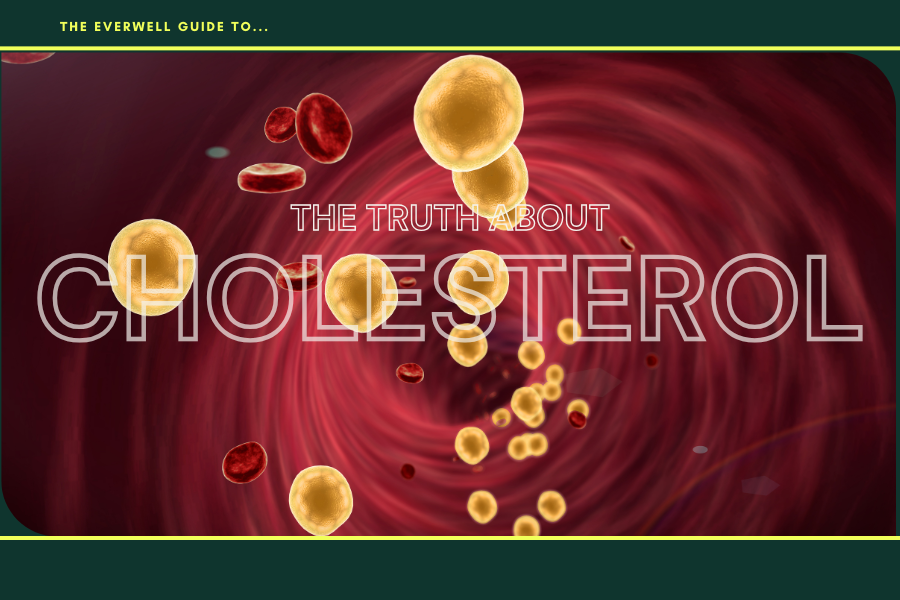Cholesterol: Explained
- The Everwell Medical Team

Cholesterol is a term often associated with heart disease, but what exactly is it, and why does it matter? Understanding cholesterol is key to maintaining heart health and preventing long-term complications.
What Is cholesterol?
Cholesterol is a fat-like substance found in every cell of your body [1]. It is essential for:
-
Building cell membranes
-
Producing hormones
-
Making vitamin D and bile acids that help digest fats
The body naturally produces cholesterol, but we also get it from animal-based foods. While cholesterol is necessary for survival, too much of it—especially the wrong kind—can increase the risk of serious health problems.
The different types of cholesterol
Not all cholesterol is bad! It travels in the blood attached to lipoproteins, forming two main types:
Low-Density Lipoprotein (LDL)
LDL cholesterol contributes to plaque build-up in arteries, increasing the risk of heart disease and stroke [2]. High levels of LDL are linked to atherosclerosis, where arteries become narrow and stiff due to fatty deposits. This is often referred to as the "bad" cholesterol.
High-Density Lipoprotein (HDL)
HDL cholesterol removes excess cholesterol from the bloodstream, transporting it to the liver for disposal [3]. Higher levels of HDL are associated with a lower risk of cardiovascular disease. This is known as the "good" cholesterol.
Health risks of high cholesterol
When cholesterol levels become imbalanced—especially with high LDL and low HDL—serious health risks can develop:
-
Increased Risk of Heart Disease - High LDL cholesterol is a major cause of coronary heart disease (CHD), which occurs when plaques block blood flow, leading to heart attacks and heart failure [4].
-
Stroke and Blood Clots - Excess LDL cholesterol increases the risk of stroke by causing arterial blockages that cut off blood supply to the brain [2].
-
High Blood Pressure (Hypertension) - Cholesterol-related plaque build-up makes arteries less flexible, forcing the heart to pump harder to circulate blood. This leads to chronic high blood pressure, increasing the risk of heart attacks, strokes, and kidney damage [5].
-
Fatty Liver Disease - Excess fat in the liver, or non-alcoholic fatty liver disease, is a condition associated with obesity and high cholesterol [6].
How to maintain healthy cholesterol levels
-
Eat a Heart-Healthy Diet – Reducing saturated and trans fats is crucial for lowering LDL levels. A diet focused on fruits, vegetables, whole grains, and healthy fats can help [7].
-
Stay Active – Regular exercise doesn't directly affect LDL as much as diet, but it can significantly increase and strengthen your HDL cholesterol, helping to clear LDL from the body [7].
-
Limit Saturated Fats – Found in red meat, full-fat dairy, and fried foods, these fats raise LDL levels [7].
-
Quit Smoking & Reduce Alcohol – Both can negatively impact HDL cholesterol and overall heart health [8].
-
Consider Medication if Needed – For many people, lifestyle changes alone are not enough, and doctors may prescribe statins to lower LDL cholesterol [9]. The most potent statins at their highest doses can lower LDL cholesterol by up to 50% or more [10].
Final thoughts
Cholesterol is essential for the body, but too much "bad" cholesterol (LDL) can lead to life-threatening conditions like heart disease and stroke. By monitoring cholesterol levels, eating a healthy diet, and staying active, you can reduce your risk and protect your long-term health.
References
-
American Heart Association (AHA). (2022). What is Cholesterol?
-
Centers for Disease Control and Prevention (CDC). (2021). High Cholesterol Facts.
-
Gordon, D. J., et al. (1989). High-density lipoprotein cholesterol and cardiovascular disease. Circulation, 79(1), 8–15.
-
Grundy, S. M., et al. (2019). 2018 AHA/ACC/AACVPR/AAPA/ABC/ACPM/ADA/AGS/APhA/ASPC/NLA/PCNA Guideline on the Management of Blood Cholesterol. Circulation, 139(25), e1082–e1143.
-
Chobanian, A. V., et al. (2003). The Seventh Report of the Joint National Committee on Prevention, Detection, Evaluation, and Treatment of High Blood Pressure. JAMA, 289(19), 2560–2572.
-
Targher, G., et al. (2020). Risk of Cardiovascular Disease in Patients with Nonalcoholic Fatty Liver Disease. Nature Reviews Cardiology, 17(10), 620–637.
-
Virani, Salim S., et al. (2023). 22023 AHA/ACC/ACCP/ASPC/NLA/PCNA Guideline for the Management of Patients With Chronic Coronary Disease. Circulation, 144(17), e125–e227.
-
Public Health England. (2016). Health matters: harm from alcohol and drugs.
-
National Institutes of Health (NIH). (2021). Statins:
-
Cholesterol Treatment Trialists' (CTT) Collaborators. (2010). Efficacy and safety of more intensive lowering of LDL cholesterol: a meta-analysis of data from 170,000 participants in 26 randomised trials. The Lancet, 376(9753), 1670–1681.








